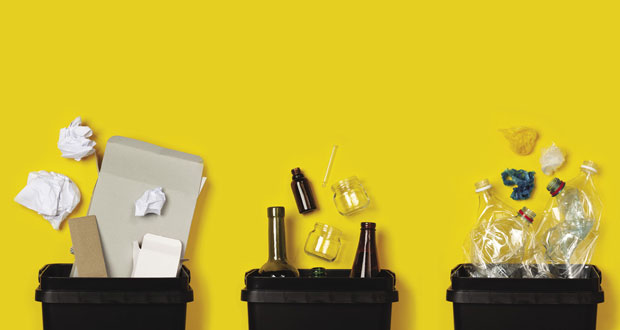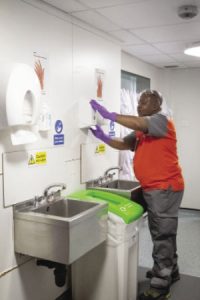As workplaces prepare for reoccupation, the role of waste management experts is more important than ever to help customers navigate uncharted territory and meet their environmental waste targets, reports Sara Bean
Over the past year, as the majority of office staff remained at home, the local authority officer group ADEPT asked local councils to complete waste impacts surveys to chart the changing status of waste services across England and the continuing impacts of COVID-19(1). According to the week commencing 15th March 2021, 71 per cent of responding authorities highlight a lesser-than-usual level of collected commercial waste.
Given this unprecedented fall in the level of collections, as the economy opens up, businesses will need to completely reassess their waste/recycling needs, especially as office occupancy will in all probability remain low. But Jack Yarrow, Regional Sales Manager at Grundon(2) says the more blended approach to home/office working is something for which the waste management company is prepared.
“We’ve already been having conversations with our customers about how we can tailor our services to meet those changing needs, offering increased flexibility and solutions that will work best for everyone.
“For example, we’ve used the quieter times to look at route optimisation. It makes sense that if volumes of waste to be collected are lower than pre-pandemic, we should be re-evaluating our waste collection schedules to ensure maximum efficiency and make sure customers receive optimum value for money.”
Xavier Aragon, Head of Integrated Facilities Management, Veolia UK(3) feels that this could be a good time to make changes to the waste and recycling systems to enhance both sustainability and a lower carbon footprint.
“Reassessment of waste streams looking at improvements to existing streams and opportunities for new initiatives will improve segregation and help clients move their waste up the hierarchy,” he says.
“Improvements could include things like new and improved signage, clearer systems, and the review of opportunities for single use items that are more common now with COVID precautions. Likewise, consideration should also be made towards moving back to sustainable provision albeit in a likely reduced capacity for the future, as general ways of working change on a more permanent basis.
“Consideration should also be made towards the reduction of bins to suit the new workplace settings, or to purchase new bins and improved recycling stations to give a fresh new look. This will engage with people as they either return to the workplace or continue with flexible working in a new way. Benefits to this will allow for a client to engage with their staff concerning their environmental impact.”
Jamie Woodhall, UK Technical and Innovation Manager, Initial Washroom Hygiene(4) warns that it’s important to consider that any work-related waste produced by employees working from home is technically still commercial waste – and may contain confidential data relating to a company’s suppliers, employees and clients.
He advises: “Facilities and compliance managers will need to be sure that any waste generated off site is minimised, either by enforcing electronic documentation, or by ensuring that employees know to collect, store and destroy any confidential data in these instances.”
When it comes to waste generated in offices as buildings open up, it is unlikely that onsite recycling needs will change drastically, and more consideration will need to be given to waste disposal.
“This is particularly true for items such as face masks,” says Woodhall. “While these will not need to be separated from other washroom waste under government guidelines, it is still a point of concern for people thinking about returning to the office. Research from Initial Washroom Hygiene found 66 per cent of people in the UK want more bins in shared washrooms so they can properly dispose of single-use items such as gloves, face masks and tissues – making this a priority action for facilities and building managers.”
According to Government guidelines(5) lateral flow waste is only classified as ‘clinical waste’ if testing is carried out on registered healthcare and medical sites. While this means that lateral flow testing waste generated in offices can be disposed of in regular bins rather than in designated PPE waste bins, it’s still crucial that facilities managers ensure waste collection in washrooms and on the wider premises is safe and hygienic when employees return to work.
Says Yarrow: “For that reason, and also because the regulations can change, our advice to FMs is to talk to us as the compliance experts. It is our job to ensure that all our customers remain 100 per cent compliant and we can provide the necessary information and materials, such as specialist waste sacks and separate storage containers, to make this as easy as possible.
“Using our experience, based on the number of employees and the number of tests taking place, we can also advise on the likely quantities required and the number of waste collections needed. Where COVID-19 waste needs specialist secure transportation and treatment, we have our own vehicles and disposal facilities to make this happen safely with the minimum of fuss.”
Aragon advises that face masks may be disposed of via a general waste, black bag disposal and do not require any form of special handling. In a home environment this would refer to the household waste collected by councils.
“In a workplace this is no different and client staff may freely dispose of face masks in the black waste bags. Dependent on the clients chosen disposal route for this afterwards this may allow them to be freely disposed of to landfill or other alternative disposal routes such as Waste to Energy if so desired, the latter being the better environmental route.”






